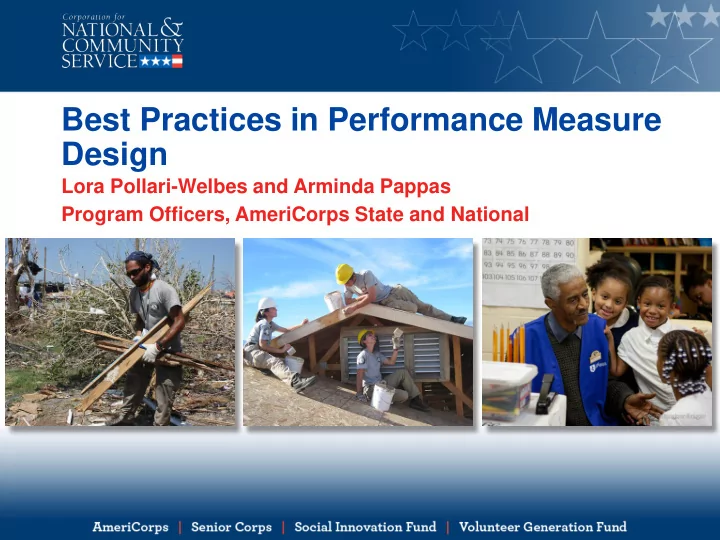

Best Practices in Performance Measure Design Lora Pollari-Welbes and Arminda Pappas Program Officers, AmeriCorps State and National
Performance Measurement • Ongoing, systematic process of tracking your program or project outputs and outcomes • Outputs: Amount of service provided (people served, products created, or programs developed) • Outcomes: Changes or benefits that occur – Can reflect changes in individuals, organizations, communities, or the environment – Typically include changes in knowledge, attitudes, behavior, or condition – Must have a logical connection to the intervention and be aligned with outputs
Purpose of Performance Measurement • Recognition of progress – Collect reliable information about the intervention’s implementation and progress toward outcomes • Accountability to funders and stakeholders – Communicate achievements in a meaningful and compelling way • Program improvement – Spot and correct problems – Strengthen the intervention – Determine where to allocate limited resources
How CNCS Uses Performance Measures • Tell the story of the collective impact of national service programs • National Performance Measures: – Reflect CNCS Strategic Plan and programming priorities – Allow for consistent terms, definitions, and approaches to measurement (“speaking the same language”) – Priority Measures: used across multiple CNCS programs – Complementary Measures: customized for particular programs (e.g., AmeriCorps) • Applicant-determined Measures*: – Intended for programs whose interventions, outputs, or outcomes do not fit under existing National Performance Measures *Some National Performance Measures have applicant-determined outcomes
Best Practices: Performance Measure Design • Select PMs that fit your program design and theory of change, not vice versa • Read the instructions • Less = more: focus on a small number of high-quality measures • Measure outputs and outcomes for program beneficiaries* • Clearly define all terms used • Include a full set of information in the PM screens *Except for member development and teacher corps measures
Best Practices: Performance Measure Design • Use national measures when they fit the program design • Clearly distinguish outcomes from outputs while maintaining logical alignment • Choose outcome measures that are ambitious but realistic; ensure that the program can realistically document or track the required information. • For outcomes that require participant follow-up, set targets that take into account response rate attrition • For longer-term outcomes, set targets that are achievable in a single grant year
Best Practices: Performance Measure Design (continued) • Use numerical targets, not percentages • Use pre-assessments to get baseline data so that changes can be objectively assessed, rather than measuring perceptions of change retroactively • Select data collection instruments that are valid (measure what they are supposed to measure) and reliable (yield consistent results) • Choose data collection instruments that are accessible and yield timely data • Allocate sufficient resources toward data collection efforts: money, time, personnel • Self-assess your measure using the Performance Measure Checklist
Designing a Measure: Education Program Overview: The EduCorps Program is requesting six half-time AmeriCorps members to lead one-on-one and small-group tutoring programs for middle-school students at a high-poverty school. The primary goal of the program is to improve students' achievement levels in mathematics and to help students stay on track for high-school graduation. Members will meet with groups of 1-3 students after school each day for about an hour each, using mathematics enrichment materials that complement the normal classroom curriculum. Members will also lead daily large- group activities focused on physical activity and healthy eating.
Step 1: Choose the Right Measure(s) • Primary service activity: academic tutoring (K-12 Success) • CNCS has several PMs related to K-12 Success: • The structure and goals of EduCorps ’ tutoring intervention are consistent with measures ED1, ED2, and ED5.
Step 2: Study the Instructions for Each Measure • Read the NPM Instructions carefully for each measure to make sure the program can meet all requirements (eligibility, measurement types, etc.)
Step 2: Study the Instructions for Each Measure (continued) • Applicants that cannot meet the requirements for a measure should not use it.
Step 3: Define All Terms Clearly • ED2: – “In the approved grant application, the program should indicate how much time (i.e. how many days or hours) is required in order to complete the activity .” – EduCorps definition: At least 3 one-hour sessions per week for a minimum of 20 weeks. • ED5: – “The amount of progress required to count as ‘improved academic performance’ must be specified in the approved grant application .” – EduCorps definition: At least 1.1 years of growth from the beginning of the year to the end .
Step 4: Calculate MSY and Member Allocations • Determine how many members, and what portion of member time, will be devoted to activities captured by the PM • Members can be counted toward more than one PM; MSYs cannot • Not all members and MSYs need to be allocated to PMs • EduCorps MSY and member allocations: – 6 members – 2.0 MSY (2/3 of total member time [3.0 MSY])
Step 5: Set Output and Outcome Targets • Targets should be ambitious but realistic • Outcome targets should relate logically to output targets EduCorps targets: - ED1: 100 students - ED2: 90 students - ED5: 60 students
Step 6: Select Appropriate Instruments • Must meet requirements stated in the National Performance Measure instructions • Must be valid, reliable, consistent, accessible, and timely • Must be clearly described in the performance measure (including assessment name if possible)
Step 7: Put it All Together
Additional Resources • 2016 Performance Measure Instructions: http://www.nationalservice.gov/sites/default/files/documents /Performance_Measure_Instructions_2016.pdf • Performance Measurement Core Curriculum: http://www.nationalservice.gov/resources/performance- measurement/training-resources – Performance Measurement Basics – Theory of Change – Evidence – Quality Performance Measures – Data Collection and Instruments
Additional Resources (continued) • How to use the CNCS National Performance Measure Instructions: http://www.nationalservice.gov/resources/performance- measurement/how-use-cncs-national-performance- measure-instructions • How to navigate the eGrants Performance Measure Module: http://www.nationalservice.gov/resources/performance- measurement/egrants-performance-measures-module- americorps
Recommend
More recommend